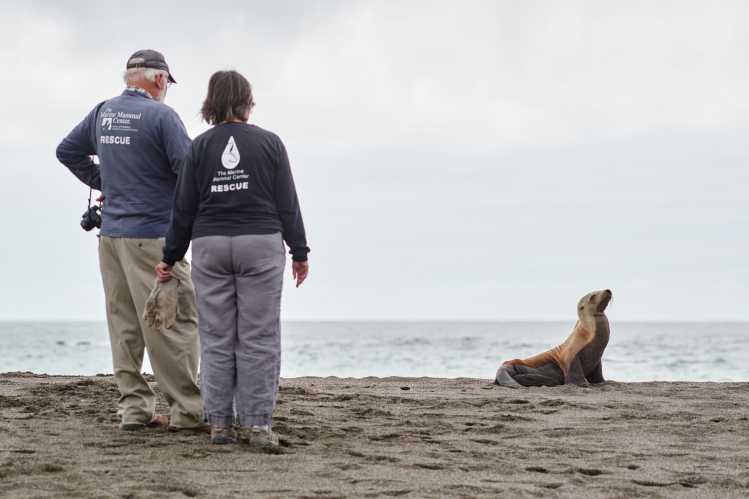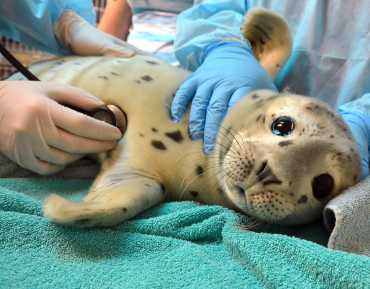
San Francisco Bay Area a Hot Spot for Marine Mammal Harassment, Experts Say
- Behavior
- Natural history
In 2022, our experts received reports of, or observed, more than 25 percent of our seal, sea lion and sea otter patients experiencing negative interactions with humans and/or dogs – part of a wider issue of wildlife interference by humans
The Marine Mammal Center, the world’s largest marine mammal hospital, reports that data gathered last year on the impact of human wildlife interaction highlights a complex and concerning threat for marine mammals in the San Francisco Bay Area and along the California coast.
The Center reports that wildlife harassment by people and dogs was a contributing or direct factor in more than 150 cases of marine mammals being rescued and admitted to the Center’s Sausalito hospital in 2022. This accounts for 27 percent of all patients admitted last year. The data also reveals that these incidents were just as prevalent in the summer and fall as they were during the Center’s busy spring pupping season.
In the San Francisco Bay Area specifically, illegal pickups of harbor seal pups in Marin County and human and dog interactions with young seals and sea lions in San Francisco and San Mateo County were the standout harassment case examples.
A tragic case that illustrates the impact harassment can have on a marine mammal’s life is the story of a harbor seal named Snowcone. This male pup who was young enough to still be nursing was rescued in April 2022 at Shell Beach in Sonoma County after being illegally picked up and separated from its mother by two beachgoers.
Unfortunately, trained Center responders noted upon arrival to the scene that the pup had suffered severe head trauma consistent with a dog attack. This incident likely occurred after the animal was moved away from the established rookery, or breeding area, to a part of the beach with numerous off-leash dogs. The pup sadly died as a result of its injuries on the way to the Center’s hospital.
“While the overall numbers of marine mammal harassment cases within the San Francisco Bay Area were less than those along the Central Coast, we unfortunately saw more severe cases of harassment locally,” says Adam Ratner, Associate Director of Conservation Education. “The tragic case of Snowcone highlights that we have a community that loves marine mammals and wants to help them. But the only way to ensure the safety and wellbeing of these animals is to first call the experts and keep a safe distance until trained responders arrive.”
The only way to ensure the safety and wellbeing of these animals is to first call the experts and keep a safe distance until trained responders arrive.
You Can Be an Advocate for Stranded Marine Mammals
You can help spread the word about the importance of remembering to #LeaveSealsBe on social media and in your community. Download and print a rescue card to keep with you or share with others.
Our Rescue and Response Volunteers are responsible for rescuing and transporting marine mammals along 600 miles of the northern California coast. You can join our volunteer community and help make second chances possible.
While crowding is the most prevalent form of harassment range-wide, a significant number of harassment cases were more severe, including dragging the animal, touching it, attempting to feed it or pouring water on it. Harassment by dogs accounted for more than a quarter of all cases.
“While on the surface, taking a close-up selfie or having your dog off-leash near a marine mammal may seem cute and innocent, it can create real challenges, especially for young seals and sea lions,” says Ratner. “These behaviors can separate young pups from their mothers, increase stress and potentially increase the risk for disease transmission between people and animals.”
Now armed with strong baseline data to make year-over-year comparisons going forward, the Center’s team is utilizing a multi-pronged approach this year to address the issue of human wildlife interaction, including working with behavior change experts. These initial efforts include trying to reach beachgoers, tourists and small businesses in key interaction hot-spot areas with information about how to safely share our shores and local waterways with marine wildlife.
More specifically, The Marine Mammal Center is also seeking to identify the following:
- Motivations for problematic behaviors such as touching, moving, harassing or taking up-close selfies with marine mammals
- Attitudes, knowledge and demographics associated with such behaviors and the consequences of these problematic actions
- Leaders in the community who can help spread the message of how to protect marine mammals
Your Call Makes a Difference
When marine mammals are sick, they're telling us that the ocean is sick, too. The Marine Mammal Center rescues and cares for these animals, and investigates the threats they face in the wild.
The Marine Mammal Center's rescue hotline is available 24 hours a day, and our trained teams respond to marine mammals in need seven days a week, 365 days a year. Our life-saving rescues are made possible with the support of people like you.

Harassment Breakdown by County (all species)
Santa Cruz – 35 cases (21% of all cases)
Monterey – 31 cases (19% of all cases)
San Luis Obispo – 30 cases (18% of all cases)
San Mateo – 21 cases (13% of all cases)
San Francisco – 13 cases (8% of all cases)
Marin – 12 cases (7% of all cases)
Sonoma – 8 cases (5% of all cases)
Mendocino – 1 case (1% of all cases)
Solano – 1 case (1% of all cases)
Header image: Photo © Rob Cala
Yes, I want to save a life!

Yes, I want to save a life!
You’ll be giving sick and injured animals the best possible care at the Center’s state-of-the-art hospital. With your gift today, you are giving a patient a second chance at life in the wild.
See Our Latest News
{"image":"\/Animals\/Wild\/Gray whale\/cropped-images\/two-gray-whales-golden-gate-bridge-shutterstock-0-0-1270-992-1770234810.jpg","alt":"two gray whales under the Golden Gate Bridge","title":"The Marine Mammal Center and San Francisco Harbor Safety Committee Pilot New Vessel Operator Training Program","link_url":"https:\/\/www.marinemammalcenter.org\/news\/the-marine-mammal-center-and-san-francisco-harbor-safety-committee-pilot-new-vessel-operator-training-program","label":"Press Release","date":"2026-02-06 01:00:00"}

The Marine Mammal Center and San Francisco Harbor Safety Committee Pilot New Vessel Operator Training Program
February 6, 2026
Read More{"image":"\/Animals\/Wild\/Bottlenose dolphin\/cropped-images\/dolphinphoto-by-adam-li-c-noaa-0-0-1270-992-1769539954.jpg","alt":"A bottlenose dolphin jumps out of the water.","title":"What\u2019s the Difference Between Dolphins and Porpoises? And Other Animal Trivia","link_url":"https:\/\/www.marinemammalcenter.org\/news\/whats-the-difference-between-dolphins-and-porpoises-and-other-animal-trivia","label":"News Update","date":"2026-01-26 23:00:00"}

What’s the Difference Between Dolphins and Porpoises? And Other Animal Trivia
January 26, 2026
Read More{"image":"\/Animals\/Patients\/Sea otters\/2025\/cropped-images\/so-mooring-release-2-laurie-miller-c-the-marine-mammal-center-USFWS-permit-MA101713-1-147-8-1270-992-1770307740.jpg","alt":"Sea otter - Mooring","title":"Rescue Stories: Southern Sea Otter Mooring Named the 2025 Patient of the Year","link_url":"https:\/\/www.marinemammalcenter.org\/news\/rescue-stories-vote-for-your-favorite-marine-mammal-patient-of-2025","label":"News Update","date":"2026-01-16 10:05:08"}

Rescue Stories: Southern Sea Otter Mooring Named the 2025 Patient of the Year
January 16, 2026
Read More{"image":"\/People\/Action\/Veterinary care\/cropped-images\/Harris_Green turtle_TMMC-0-0-1270-992-1767649941.jpg","alt":"Heather Harris","title":"Seattle Aquarium Awards Dr. Heather Harris With Prestigious Conservation Research Award","link_url":"https:\/\/www.marinemammalcenter.org\/news\/seattle-aquarium-awards-dr-heather-harris-with-prestigious-conservation-research-award","label":"In the News","date":"2026-01-05 04:48:00"}

Seattle Aquarium Awards Dr. Heather Harris With Prestigious Conservation Research Award
January 5, 2026
Read More


